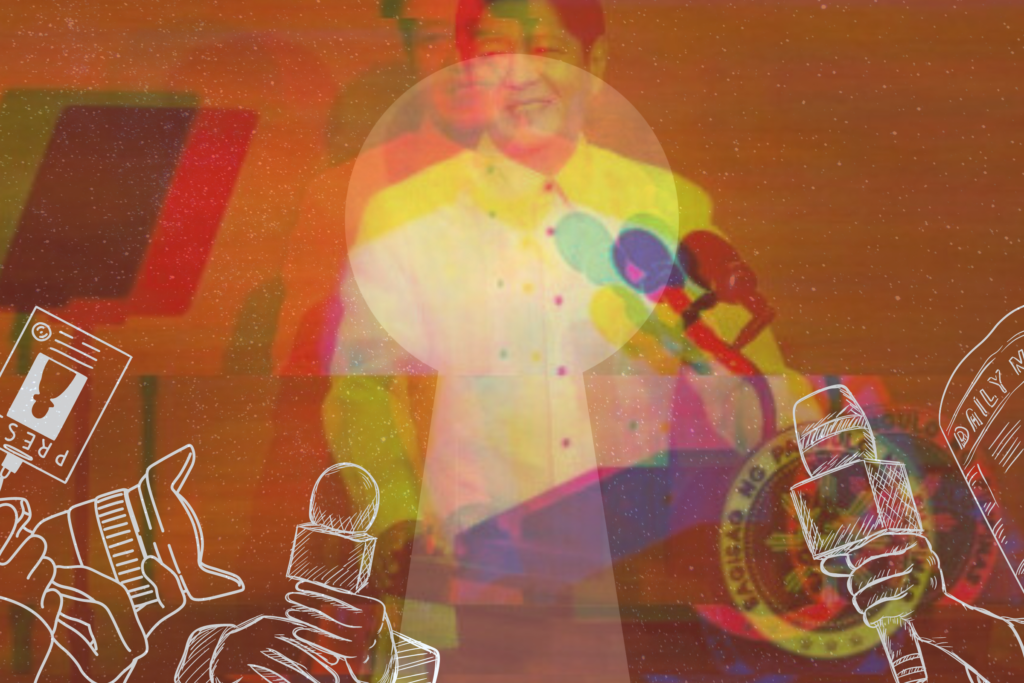Rappler describes Marcos’ relationship with the media

CHEERS TO Rappler for its report on the “closely managed” access of the press to President Ferdinand Marcos Jr. Rappler’s Gaby Baizas described how “inaccessible” the President is; adding that attacks and threats against the press persist under his administration.
As the President’s second State of the Nation Address (SONA) approaches, the media have begun to report on the Palace preparations for July 22. Weeks before the date, Rappler began its series to assess the state of the nation as it sees it. So far the digital publication has reviewed the implementation of jeepney consolidation as part of modernization program; the Uniteam alliance, and Marcos’ stance on the LGBTQIA+ community, among others.
On July 1, the series focused on the President’s relationship with the media; a crucial aspect of national affairs. How effectively the President communicates with the media determines how much news the public gets about the conduct of the presidency – a way of letting the public know about the quality of leadership, his dedication to his duties, and the time he gives to the problems of the nation.
“Inaccessible”
Baizas described Marcos as “consistently being difficult to reach” and media access as “challenging.” She recalled that Marcos and his team kept the media at arms’ length during his campaign for the presidency, often avoiding debates and giving only a few interviews to selected members of the press.
As President, Marcos Jr. has not made himself more available to journalists. Baizas interviewed reporters covering the president on various platforms to get more information about the relationship between the media and the President. The group named the “hurdles” set against effective presidential coverage:
Lack of a presidential spokesperson
Marcos stands apart from most presidents for not assigning one person to speak for him regularly. The absence of a spokesperson or any official assigned to this task cuts down on the information flow, preventing the public from knowing what matters have taken up the President’s time.
Current palace press briefings under Marcos Jr. are not about what the President is doing or his preoccupation with certain issues. Weekly briefings for the Malacañang Press Corps (MPC) have been done by officials from different government departments providing updates on their agencies. As there are already reporters assigned to the different departments, Malacañang reporters are missing out on their primary assignment, which is to get information on their “beat” which should be about matters preoccupying the Chief Executive.
Limited “pool” system
Only a handful, two to five, of news organizations get access to certain presidential events. When more reporters signify their interest than the number of allotted slots, the MPC draws lots using a randomized app. Baizas noted the contrast of this aspect to other administrations which opened most Palace events to all media outlets.
Fewer press briefings
With Marcos Jr., the Palace typically only holds press briefings once a week. The report compared the situation to Marcos Jr.’s predecessor, Rodrigo Duterte, who did not provide sufficient opportunities either to engage with the media. But Duterte assigned spokespersons who faced the media frequently, answering their questions; Salvador Panelo and Harry Roque, both lawyers, did their stints on this post in the previous administration.
Slow response
Reporters also pointed to the President’s slow response to significant and sensitive breaking events, such as the June Ayungin Shoal incident and Sara Duterte’s resignation. CMFR pointed out that Marcos was silent for six days before issuing a statement on the West Philippine Sea incident.
Advance questions
Baizas said that reporters are asked to send in questions in advance. Reporters, as Baizas noted, said the PCO even refuses to entertain certain questions, especially if they’re about events that just happened; as it takes a while for them to get the official statements.
Rare one-on-ones
Baizas also recalled the rare one-on-one interview of Marcos with ABC journalist Sarah Ferguson, who while on the air called him out for laughing when she asked him about the Marcos family’s ill-gotten wealth. Reporters said that foreign media have more leeway in their treatment of the President and can be critical of Marcos as Malacañang reporters “have to maintain a good working relationship with the Palace to avoid getting cut off for the rest of the President’s term.”
The article also highlighted Marcos Jr.’s lack of action to enable press freedom. After he took office, alternative news sites Bulatlat and Pinoy Weekly remain blocked per order of the National Telecommunications Commission. Community journalist Frenchie Mae Cumpio is still detained, and four journalists have been killed since he took office.
Marcos and Duterte
Duterte openly declared his hostility against journalists and used obscenities against those who dared to ask him questions. His attacks against Rappler and Maria Ressa along with the closure of major TV network ABS-CBN are of public record.
Meanwhile, Marcos Jr. has not shown any kind of animosity toward any member of the press. He has been quite circumspect about how he feels about the media. He takes his time to issue statements or orders on the implementation of policy matters that require discussion.
The report does not speculate about the reasons for the structural weaknesses in his press policy and its impact on public information flow. However, it reveals the lack of access to Marcos Jr., preventing public scrutiny of the highest office.
The present system keeps the policies out of reach and evades the necessary critical analysis. It keeps inquiry at bay.
It also cuts down positive gains. The absent President or his failure to engage freely with members of the media can also keep the work schedule unseen; the dedication and hard work unmeasured, if these qualities exist.
With the nearing SONA, reports should follow up with an inventory of the lack of actions to his proclamations or statements of intent. The people have a right to be reminded.
Leave a Reply